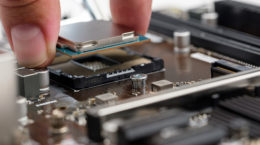Agricultural towns, export of petroleum products, the Hi-Tech Park… As well as many other things already difficult to remember which the «eternal president» wanted to turn into a new source of wealth for the country. Now Lukashenka is betting on microelectronics. It sounds wonderful, yet it is actually a very dangerous issue.
On March 17, 2023, Aliaksandr Lukashenka gave a long and enthusiastic speech about how Belarus is going to become wealthy by producing various microelectronics, microchips and selling them to different countries, Russia the first among them.
The reason for the speech and for reports of the propagandists lost in admiration was the visit paid by Lukashenka to Planar holding company where he held a meeting on the prospects for development of microelectronics. Before the meeting, Lukashenka got acquainted with the work of the holding and prospects of its development, and gave a look at pilot projects of optical mechanical precision processing equipment produced with the use of laser technology.
Later, Lukashenka started the meeting with banalities. Allegedly, today great attention is paid in the world to the development of microelectronics. «[It’s the issue] of no small importance – the fight for such production facilities and markets is a reason why military collisions begin. This is how important this part of economy is», he acknowledged the reality of 30 years ago. «It is here, at Planar, in the 60s of the previous century, the brain and the heart of microelectronics of the Soviet Union was created. Also today, the Belarusian manufactures occupy their niche in the world market. All that is despite the global trend in the direction not of micro, but nanoelectronics, when several actors appeared that own technology of about four nanometers. Our quite big microchips stay in demand. They are reliable. Yet, as I understand, we should move from these big microchips to another direction, to those small nanometers».
Well, something more interesting was said further on. According to Lukashenka, Belarus and Russia have formed a list of critically important electronic components base, and Belarusian enterprises have already started their first supplies. «We have already started to supply a number of elements to Russian enterprises. An agreement on establishing a joint Belarusian-Russian center for design and production of photomasks has been signed. It will allow to perform joint research and development, decrease the dependency of Belarusian and Russian users from import supplies», Lukashenka said. Also, the regime approved the program of development of the microeconomic industry of Belarus till the year 2030.
The general director of the Planar holding company, Sergei Avakov, told the journalists that the enterprises of the holding are contracted up till the year 2026. According to him, the number of those who are willing to purchase the equipment produced there is growing: «The cooperation with Russia, undoubtedly, has increased. The number of orders has risen. To be fair, that actually happened as long ago as in 2021. Long-term contracts appeared. This year and the previous year, the number of those willing to buy our equipment, has grown. Now, we are thinking only about how to manage and do everything in time, we are launching a production expansion project».
In terms of numbers, everything looks great: in the last year, Planar has increased the export by 70%, and the revenues from sales constituted 57.5 mln BYN (exceeding the revenues in 2021 by 21%). The net profit reached 26.4 mln BYN (against the planned 12.2 mln). The profit margin was almost 13%.
Nevertheless, what’s the sense of it? Will Belarus ever be capable to become one of the significant microelectronics manufacturers in the world even with a lot of effort? Let’s compare the numbers.
Today, over a third of the world’s semiconductors are produced in South Korea. The government of South Korea, together with 153 Korean companies, published an ambitious plan providing for investments into the semiconductors production in the amount of 450 bln USD in the next 10 years. The companies Samsung Electronics and SK Hynix are going to lead in the South Korean program. Thus, by the year 2030, Samsung will have spent over $151 bln to expand production capacities, and SK Hynix – $97 bln. Besides that, Hynix is planning to spend $106 bln on the construction of four new factories.
That means, South Korea only, the country with already strong microelectronic base, is going to spend a good ten Belarusian state budgets on its development in just a few years. In such a situation, Planar’s microchips mostly resemble stone axes. So, no «revolutionary breakthrough» can be expected here.
Then why Aliaksandr Lukashenka has taken up to the Belarusian microelectronic industry which is somewhere in the 20th century? The answer is simple: weapons. Russia is conducting an aggressive war against Ukraine, and is rhetorically threatening the whole NATO alliance. Modern weapons need a lot of microelectronic components, optoelectronic systems and other things which Russia cannot produce, and even if it once could, it has unlearned it.
In the recent decades, the Russian Federation simply imported all military electronics, using the «oil money» as a remedy for its technological problems. However, after the Kremlin had started its aggression against Ukraine, the developed countries stopped supplying electronic components to Russia. Even China, although not joining the sanctions, avoids supplying military electronics to Russians, just to stay away from unnecessary troubles.
So, only two ways are left for the Russian military industry. The first one is secret purchases of microelectronics through bogus companies around the world. However, it’s difficult and unrewarding: Western special services uncover and stop such operations easily. The second way is to develop the military microelectronics industry in Belarus, where the Soviet industrial base has somewhat survived.
Thus, Lukashenka’s inspiration becomes understandable: he has been shown a big fat wad of cash by the Kremlin, and he does not care that Belarusian enterprises are going to work to foment the war. It is because of him that Belarus has already become a co-aggressor in Russia’s war against Ukraine. A place in hell for him has already been booked.
In the next article of the cycle, we are going to speak about the achievements in the sphere of military microelectronics that Belarus really has and about what it sells to Russia, Iran, Venezuela, Sudan, Syria and other countries with not such a great reputation.










